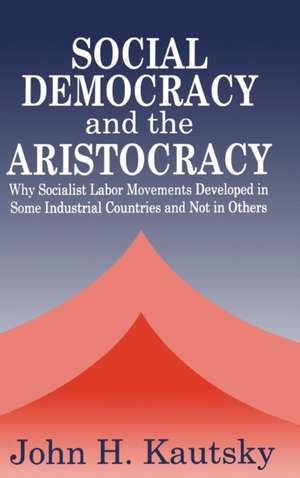Social Democracy and the Aristocracy
Editat de John H. Kautskyen Limba Engleză Hardback – 31 dec 2001
| Toate formatele și edițiile | Preț | Express |
|---|---|---|
| Paperback (1) | 389.38 lei 6-8 săpt. | |
| Taylor & Francis – 16 apr 2018 | 389.38 lei 6-8 săpt. | |
| Hardback (1) | 1003.43 lei 6-8 săpt. | |
| Taylor & Francis – 31 dec 2001 | 1003.43 lei 6-8 săpt. |
Preț: 1003.43 lei
Preț vechi: 1223.70 lei
-18% Nou
Puncte Express: 1505
Preț estimativ în valută:
191.100€ • 200.48$ • 158.55£
191.100€ • 200.48$ • 158.55£
Carte tipărită la comandă
Livrare economică 15-29 aprilie
Preluare comenzi: 021 569.72.76
Specificații
ISBN-13: 9780765800916
ISBN-10: 0765800918
Pagini: 242
Dimensiuni: 152 x 229 x 24 mm
Greutate: 0.54 kg
Ediția:New.
Editura: Taylor & Francis
Colecția Routledge
Locul publicării:Oxford, United Kingdom
ISBN-10: 0765800918
Pagini: 242
Dimensiuni: 152 x 229 x 24 mm
Greutate: 0.54 kg
Ediția:New.
Editura: Taylor & Francis
Colecția Routledge
Locul publicării:Oxford, United Kingdom
Notă biografică
Kautsky, The Politics of Aristocratic Empires (both available from Transaction), and Marxism and Leninism, Not Marxism-Leninism.
Cuprins
1. Aristocratic Class Consciousness and Survival 2. The New Working Class and Its Class Consciousness 3. Socialist Parties Without a Mass Labor Base 4. The Growth and Optimism of Early Social Democracy 5. The Socialist Position on Democracy on Capitalism and on the Aristocracy 6. The End of Socialist Growth the Need for NonWorkers Votes and the Changing Working Class 7. From Workers Party to Peoples Party From Exclusion to Partnership 8. The Social Democrats Achievements and Prospects 9. The Evolution of Japanese Social Democracy 10. Britain the United States and Canada Late Socialism No Socialism and Little Socialism 11. The Aristocracy and Modernization From Without 12. The Modernizers Revolution Their Regime and Their Dilemma 13. Societies in the Wake of Modernizing Regimes 14. Labor Under Post Modernizing Regimes 15. The Absence of Socialist Labor Parties
Descriere
Ever since the rise of mass labor movements in the late nineteenth century, socialism has been seen as an inevi- table and antagonistic response to capitalism and the spread of industrialization














